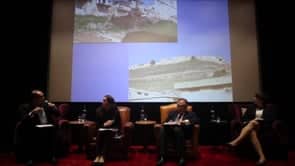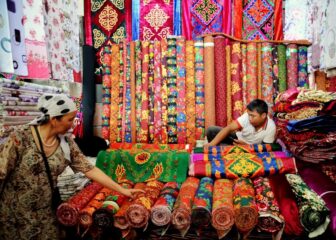Browse Topics
Categories
Format
Multimedia
Speakers Series

Higher Education Policies and Overeducation in Turkey
March 2016. In Spring of 2015, the Hollings Center organized a conference entitled, Bridging the Disconnect Between Education and the Economy, exploring the breakdown between higher education and the labor market. Out of this conference, we supported a small grant for two participants to explore this phenomenon in greater depth in the context of Turkey […]

Protecting Cultural Heritage in Conflict: A Dialogue on Emergency Efforts
For any observer of Taliban reign in Afghanistan, the images of the collapsing Bamiyan Buddhas in 2001 must be emblematic of the high price of war and extremism on humankind’s common cultural past. Likewise, for the current generation that is witnessing one of the worst humanitarian disasters in history, the explosion of Palmyra is an […]

Preserving Cultural Heritage in Conflict
The deliberate targeting of cultural heritage in times of war and conflict is damaging on many levels: it robs countries of their past and impoverishes our shared heritage. What actions can be taken to mitigate the destruction? On October 15, 2015, the Hollings Center hosted a panel discussion entitled, “Preserving Cultural Heritage in Conflict” to […]

Afghanistan 2015: From Transition to Transformation
At the start of 2015, it became readily apparent that Afghanistan will undergo significant transformations in the coming years. The United States referred to the year 2014 as a “transition” point for Afghanistan, as the International Security Assistance Force’s (ISAF) drawdown of forces shifted more of the security and economic responsibility to the Afghan government. […]

Challenging Extremist Ideology, Propaganda and Messaging: Building the Counter-narrative
Violent extremism has been a predominant regional and global security challenge for several decades, but in recent years, it has become more attractive to disenfranchised people all over the world. A combination of theology, political ideology and media savvy messaging make groups like Daesh, Al Qaeda and al Shabab relevant and uniquely positioned to broadcast […]

Key Strategies in Countering Extremism: Experiences from the MENA Region and Pakistan
April 30, 2015 Kadir Has University Manal Omar, Acting Vice President of the United States Institute of Peace and Shafqat Mehmood, Co-founder and Chairman of Paiman Alumni Trust gave a talk at Kadir Has University entitled Key Strategies in Countering Extremism: Experiences from the MENA Region and Pakistan. The event was co-organized by the Hollings […]

Corporate Social Responsibility in Islam
As corporate social responsibility (CSR) becomes widespread practice around the world, there are many questions surrounding its implementation in Muslim-majority nations. How has CSR evolved in different Muslim-majority nations and throughout the world? How do Islamic banking and transactions play a role? Can CSR support employability efforts, entrepreneurship, and job creation? How can CSR activities […]

High and Dry: Addressing the Middle East Water Challenge
Often overshadowed by its political turmoil, the Middle East faces increasing environmental and resource-based challenges, such as depleting water resources. Recognizing the need to find possible collective solutions, the Hollings Center and the Prince Mohammad bin Fahd Program for Strategic Research and Studies at the University of Central Florida convened a conference to address challenges […]
A non-profit, non-governmental organization dedicated to fostering dialogue between the United States and countries with predominantly Muslim populations in the Middle East, North Africa, South Asia, Eurasia and Europe
Stay Informed
Subscribe to our mailing list to stay up to date on our latest information.

